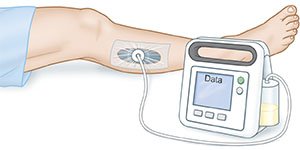Gunshot Wound to the Chest
Medically reviewed by Drugs.com. Last updated on Apr 6, 2025.
A gunshot wound (GSW) to the chest may cause damage to your heart, lungs, esophagus, ribs, or major blood vessels.
DISCHARGE INSTRUCTIONS:
Call 911 for any of the following:
- You feel lightheaded, short of breath, and have chest pain.
- You cough up blood.
- You have trouble breathing.
Seek care immediately if:
- Blood soaks through your bandage.
- Your wound comes apart.
- Your arm or leg feels warm, tender, and painful. It may look swollen and red.
- You are vomiting blood or what looks like coffee grounds.
- You feel weak, dizzy, or faint.
Contact your healthcare provider if:
- You have a fever.
- Your wound is red, swollen, or draining pus.
- You have nausea or are vomiting.
- You have questions or concerns about your condition or care.
Medicines:
You may need any of the following:
- Prescription pain medicine may be given. Ask your healthcare provider how to take this medicine safely. Some prescription pain medicines contain acetaminophen. Do not take other medicines that contain acetaminophen without talking to your healthcare provider. Too much acetaminophen may cause liver damage. Prescription pain medicine may cause constipation. Ask your healthcare provider how to prevent or treat constipation.
- Antibiotics may be given to help treat or prevent an infection caused by bacteria.
- NSAIDs , such as ibuprofen, help decrease swelling, pain, and fever. This medicine is available with or without a doctor's order. NSAIDs can cause stomach bleeding or kidney problems in certain people. If you take blood thinner medicine, always ask your healthcare provider if NSAIDs are safe for you. Always read the medicine label and follow directions.
- Take your medicine as directed. Contact your healthcare provider if you think your medicine is not helping or if you have side effects. Tell your provider if you are allergic to any medicine. Keep a list of the medicines, vitamins, and herbs you take. Include the amounts, and when and why you take them. Bring the list or the pill bottles to follow-up visits. Carry your medicine list with you in case of an emergency.
Self-care:
- Do breathing exercises as directed. Take a deep breath and hold the breath as long as you can. Then push the air out of your lungs with a deep, strong cough. Put any sputum that you have coughed up into a tissue and throw it away. Take 10 deep breaths in a row every hour that you are awake, even during the night. Remember to follow each deep breath with a cough.
- Take short walks. Walk 2 to 3 times per day. This may help prevent blood clots and help you heal faster.
- Do not lift anything heavy. Heavy lifting may place too much stress on your GSW. Ask your healthcare provider how much weight you can lift.
- Sleep in a comfortable position. Do not lie on your injured side. Sleep with your head and upper body propped up on pillows. This may make breathing more comfortable.
Wound care:
- Care for your wound as directed. Remove your bandage before showering unless your healthcare provider tells you not to. Carefully wash the wound with soap and water. Dry the area and put on new, clean bandages as directed. Change your bandages when they get wet or dirty. Monitor your wound for signs of infection such as redness, swelling, or pus.
- If you have an open wound, do not shower or get your wound wet. Your healthcare provider will tell you when your wound can get wet. Change the packing and bandage as directed. You may need to clean or rinse your wound each time you change the packing. Wash your hands before removing packing and again before placing new packing. Ask your healthcare provider how to care for your open wound.
- Negative pressure wound therapy (NPWT) uses a machine called a wound vac, wound vacuum, or pump to help with wound healing. Suction from the machine removes excess drainage from your wound and pulls wound edges closer together. NPWT promotes healthy tissue growth by increasing blood flow to your wound. NPWT also reduces bacteria that causes infections. You and your healthcare providers will be taught about your specific NPWT machine, alarms, and dressing changes.

Follow up with your healthcare provider as directed:
Write down your questions so you remember to ask them during your visits.
© Copyright Merative 2025 Information is for End User's use only and may not be sold, redistributed or otherwise used for commercial purposes.
The above information is an educational aid only. It is not intended as medical advice for individual conditions or treatments. Talk to your doctor, nurse or pharmacist before following any medical regimen to see if it is safe and effective for you.
Learn more about Gunshot Wound to the Chest
Care guides
Further information
Always consult your healthcare provider to ensure the information displayed on this page applies to your personal circumstances.
